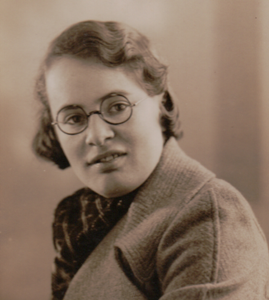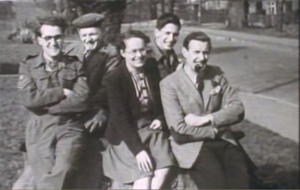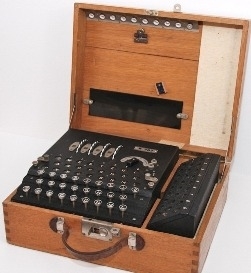 |
| (http://www.bletchleyparkresearch.co.uk/ ()) |
"Sometimes it is the people no one imagines anything of who do the things no one can imagine." (Joan Clarke). Joan Elisabeth Lowther Murray Clarke was definitely a person no one thought would do great things in life. As a woman in the early 1900's, she was expected to have a small education and a small job. But she wanted to do more in life than work in clerical and service jobs. Clarke was born in the early 1900's in London, where she grew up with her parents Dorothy and William Lowther Clarke and her three brothers and one sister. Clarke went to Dulwich High School, and her amazing academic performance earned her a scholarship to attend Newham College, an all-women division of Cambridge University. Clarke was a great numismatist and because of this she got recruited by one of her professors to work with a group of codebreakers to help break the enigma machine in World War II. Joan Clarke is a hero because she defied the things other people said about what she couldn't do. Whereas most other women did not take advantage of their intelligence because of society's expectations, Clarke believed that just because she was a woman didn't mean she couldn't do important things, and she used her intelligence to make a difference in the world.
 |
| (http://www.bletchleyparkresearch.co.uk/ ()) |
Another thing that makes Clarke a hero is that she inspired other women by achieving more than people believed a woman could in this time period. Clarke possessed the main qualities that a great male cryptologist would have. "William F Friedman, the founder of modern US cryptology wrote that a code breaker required unusual powers of inductive and deductive reasoning, much concentration, perseverance and a vivid imagination. The fact that Joan Clarke was able to move so quickly into the male cryptology area at Bletchley Park indicates she possessed these attributes" ("Joan Elisabeth Lowther Clarke Murray"). The field of cryptology was dominated by males, so it was unusual for a woman such as Clarke to be a part of the field and have such a large impact. Clarke's success in a male dominated field made her a hero by guiding women to believe they are capable of achieving as much as she did. Clarke didn't let other people's thoughts or opinions impact her. "There were eight male Banburists and Joan Clarke was the only female Banburist. However, she was one of the best Banburists and was so enthusiastic and fascinated with the technique that she would sometimes be unwilling to hand over her workings at the end of her shift and would continue to see if a few more tests would produce a result" ("Joan Elisabeth Lowther Clarke Murray"). Clarke's will to keep at her work and not show her peers proves that she gave little to no notice of what others thought of her. Her refusal to be discouraged by other people's opinions about her gender was an example to women who were intimidated by people telling them they were incapable of doing great things. Clarke's achievements and will to succeed despite the judgments she received make her an important feminist who helped many women realize that they could accomplish much in life.
Back in the early 1900's, women were not known for obtaining higher education; Clarke defied this stereotype by excelling in her academics. Both the stereotype and the reality of the time was that women were to stay at home and take care of the house and not achieve anything more than to be a top servant. "At the start of the Twentieth Century, women had a very stereotypical role in British society. If married, they stayed at home to look after the children while their husband worked and brought in a weekly wage. If single, they did work which usually involved some form of service such as working as a waitress, cooking etc. Many young women were simply expected to get married and have children. The term "spinster", though not a term of outright abuse, was still seen as having some form of stigma attached to it......that you were not good enough to get a husband etc" ("Women in 1900"). Society saw women as less capable than men and very few of them had jobs that required an education or much intelligence. It wasn't just men who expected this of women; many women themselves saw it as normal and didn't know they were capable of trying for more in life. Clarke was different. "Joan was educated at Dulwich High School and in 1936 matriculated at Newnham College, Cambridge, to study Mathematics. In 1937 and 1939 respectively, she achieved a First in Part I and Part II of the Mathematical Tripos (a three-year course leading to a BA degree) and became a Wrangler. In 1939 Clarke graduated, achieving a double first in Mathematics... In 1939 Clarke was awarded the distinguished Philippa Fawcett Prize and in 1939-1940 the Helen Gladstone Scholarship" ("Joan Elisabeth Lowther Clarke Murray"). Clarke was not just focused on having a husband and a family as most women were at this time. She wanted more for herself. She was determined to get an education and put it to use to achieve great things. And she succeeded. Clarke's college supervisor recognized her talent in mathematics and recruited her to work in Bletchley Park, helping to decode the Enigma by working with a team of male cryptologists to invent ways to quickly process the signals they received. Clarke's gender makes this achievement even more outstanding. Women were expected to be housewives or have menial jobs, so she did not have much support through her career, but she soon proved many wrong by helping to earn numerous educational awards and decode the Enigma.
 |
| (ciphermachines.com ()) |
Clarke is not just known for being a woman who did things no woman has done before; the things she did helped the whole world, both women and men, girls and boys. Clarke's achievements were for a good cause. "The full extent of Joan Clarke's mathematical contributions and accomplishments at Bletchley Park remain unknown, because of the continuing secrecy amongst cryptanalysts. Furthermore, Clarke's work is still somewhat overshadowed by her relationship with Alan Turing. Joan Clarke played a notable role in Britain's crucial achievements during World War II and it is clear that her mathematical expertise on the Naval Enigma helped to shorten the war and thereby save thousands of lives" ("Joan Elisabeth Lowther Clarke Murray"). Clarke is not only known for being a woman who did great things; what she did would have been remarkable even if she were a man. By helping to win World War II, she helped save many people's lives, which makes her a hero regardless of her gender. Clarke isn't just remarkable for the great things she did; she was also kind. "Records describe Clarke as 'congenial but shy, gentle and kind, non-aggressive and always subordinate to the men in her life' yet she was well-respected by her male peers and became Deputy Head of Hut 8 in early 1944. This was indeed rare, for there are only one or two occasions where women held leadership roles at Bletchley Park" ("Women Codebreakers."). Some people might say that Clarke's gentle personality made her seem inferior to her male peers, but Clarke proved that she could still achieve great things and rise to the top without being harsh to the people around her. In addition, some might think that Clarke would have been very egotistical because of her high achievements and fame, but she remained a very humble, kind person. Her great personality is one other thing that adds to her heroic persona. Not only did Clarke do what very few women have done, but her kindness and her impact on the world would be inspiring whether she was a male or female.
Clarke defied the stereotype about women not being able to do what men do and not being able to do great things. Her achievements showed that being a woman should not prevent one from achieving great things. She is heroic because of how she used her intelligence and because of her will to go against society's stereotypes and expectations. Women were not supposed to get higher education, but Clarke's determination to learn beyond what society thought is inspiring. Clarke was smart enough to help break the Enigma, which helped win World War II. Her actions show her as a woman who did not let people's comments or opinions impact her life. Her achievements would be extraordinary even if she was a male. If not for Joan Clarke, the world would have been a darker place for not just women but everyone. Work Cited "Hidden Her-Stories." Hidden Her-Stories. Taurus Media, 2014. Web. 04 May 2015. Jacobs, Alexandra. "A Bump in the Night." New York Times 29 Jan. 2015: E5(L). Student Resources in Context. Web. 8 May 2015. "Joan Elisabeth Lowther Clarke Murray." Clarke_Joan. Lynsey Ann Lord, July-Aug. 2008. Web. 01 May 2015. <http://www-history.mcs.st-and.ac.uk/Printonly/Clarke_Joan.html>. "OBITUARY." Journal of the Royal Society of Arts 96.4756 (1947): 22.OBITUARY. Web. May-June 2015. <http://www.britnumsoc.org/publications/Digital%20BNJ/pdfs/1997_BNJ_67_13.pdf>. "Women Codebreakers." Bletchley Park Research. Kerry Howard, 03 Oct. 2013. Web. 04 May 2015. <http://www.bletchleyparkresearch.co.uk/research-notes/women-codebreakers/>. "Women in 1900." Women in 1900. HistoryLearningSite.co.uk, 2000. Web. 18 May 2015.
Page created on 5/21/2015 12:00:00 AM
Last edited 5/21/2015 12:00:00 AM
